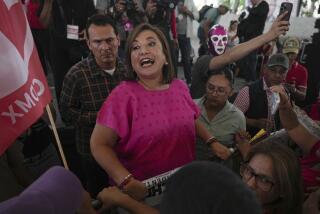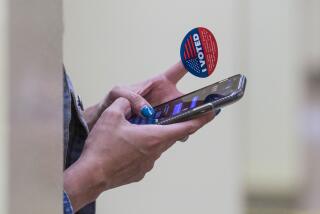Save Zimbabwe From a ‘Comfortable’ Election
- Share via
HARARE, Zimbabwe — Not long ago, we were told by state TV that this country’s ruling party candidate in the town of Bindura “comfortably” won a parliamentary seat.
Comfortably? Yes, if “comfortably” means the ability to beat, torture and intimidate the supporters of the opposition Movement for Democratic Change; comfortably, if it means that the ruling party, the Zimbabwe African National Union-Patriotic Front, can give its thugs the license to attack the convoy of the opposition leader and its presidential candidate with stones, steel bars and guns; comfortably, if it means that the MDC’s parliamentary candidate can be detained by the police on election day because someone from his group honked his horn too close to the polling station.
What we saw and heard from the capital--there were no foreign or local observers--was appalling and had nothing to do with a free and fair vote. It was a show of force by the ruling ZANU-PF.
Yet the troubles in Bindura are but the ears of the hippopotamus, as they say here.
Just a few days after this “comfortable” victory was announced, the Human Rights Forum of Zimbabwe, a respected independent umbrella organization, presented its findings about the violence surrounding last year’s parliamentary elections. The report, a gruesome narrative, ends with a list of 645 names of perpetrators, all but five of them from the ZANU-PF. None has been punished.
The report was launched at a conference that gathered more than 1,000 Zimbabweans, representing 200 nongovernmental organizations. The civil society is mobilizing itself in view of the increase in state-sponsored violence, pressures on the judiciary, the muzzling of the media and rising food prices.
There is one concrete deadline that helped to concentrate the minds of the civil society activists: Zimbabwean presidential elections must take place no later than next April. President Robert Mugabe already has indicated that he will make sure that his victory is as “comfortable” as that in Bindura.
A law that went into effect earlier this year forbids foreign organizations from giving any support to Zimbabwean political parties--never mind that Libya’s Moammar Kadafi has offered the ZANU-PF $1 million in support. One proposed law would ban NGOs from conducting voter education, and yet another gives the state a de facto monopoly over radio and television.
In its report issued last month, the International Crisis Group recommended that “the international community must insist upon both international and domestic monitoring of the process leading up to the [presidential] elections as well as the vote itself.”
Mugabe should not be allowed to pick and choose observers or decide how long they spend in the country. Another Crisis Group suggestion was for U.N. Secretary-General Kofi Annan to appoint an envoy to assist the Zimbabwe government in conducting free and fair elections.
Experience has shown that while what happens on election day in Zimbabwe may be clean, the run-up to the vote is a nasty game. Campaign monitoring well before the election must be a priority.
More to Read
Sign up for Essential California
The most important California stories and recommendations in your inbox every morning.
You may occasionally receive promotional content from the Los Angeles Times.













